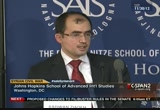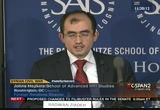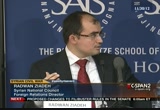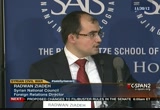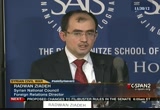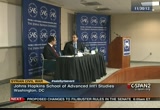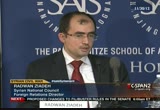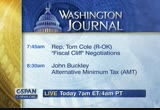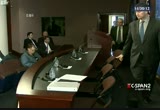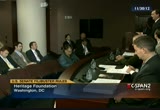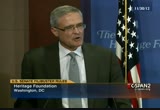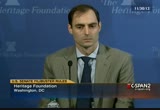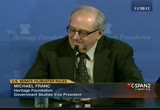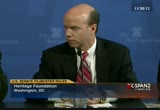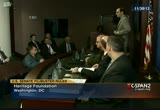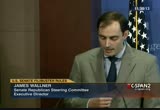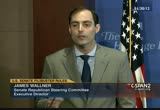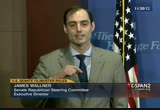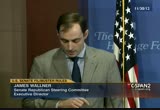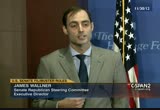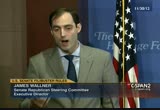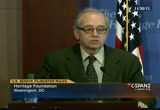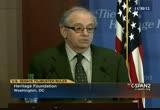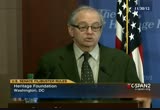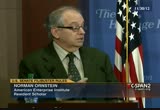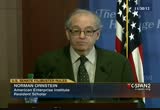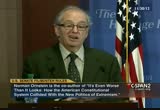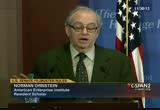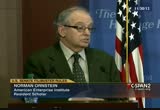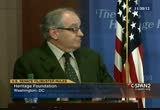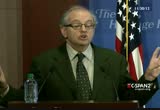tv Today in Washington CSPAN December 4, 2012 6:00am-6:38am EST
6:59 am
>> cato strongly opposes and attentive to prevent his success by gaining time with which he spun up the debate until it's too late to conclude upon anything. hey, the filibusters only been around 2064 years since circa 59 b.c. don't believe the left when they falsely claim the filibuster was created the state of the by aaron burr. the late robert byrd was the otherwise to another speaker, norm orenstein, from 2005 said
7:00 am
some things about republicans attempt use nuclear options and judgments i agree with. let me emphasize that this is a radical step it has taken. this will require breaking the, steamrolling the parliamentarian. and i must tell you i've been very disappointed in the reporting of this issue which tends to use a kind of cost and shorten over matters making it appear as if this is something that anytime can be done by a majority. they just haven't elected to before. that's not the case. it's very clear in senate rules if you challenge a ruling constitutional, that challenge is debatable and the debate itself can be filibustered. but what they're going to have to get in this case, senator calls for a point of order suggesting the filibusters unconstitutional. is ignore the parliamentarian who will say can be debated and steamrolled over the parliamentarian and basically break their own rules by not allowing debate. ornstein also argued quote
7:01 am
basically the essential character of the senate in the system, the republican form of democracy trying to avoid the emotions of the majority is to provide some outlet for minorities. change than come you can really do, i'm sorry. change that and you would be moved to the potential of tyranny to the majority. there'll always be a president of the lies the congressional leader. that temptation to overrule will always be there. it is there today. what harry reid is trying to do is wrong. if the only way for conservatism is to fight back is engage in a fight. if he is going to push the three in the senate operates under the rules there are no rules, and he has provided an unprecedented opportunity for conservatives to push real senate rules reform changes. if there are no rules since reid can't stop from offering a never ending rule, that may improve
7:02 am
the senate. two quick ideas are, the new two-thirds point of order against any intrusion, any infringement in the second amendment rights of all americans. is the subject of a simple majority vote under reid's theory. right now, if you look at the voting history of the same there is a pro-gun majority in the senate. if subject to civil majority but would have a chance of passing to another thing that is very, very important is getting rid of senate majority leader harry reid and the future majority centers. their needs new point of order to get rid of this. reid's tactic about 60 times, far more than its predecessors all combined. it is something that would allow all members of the senate to actually participate in this deliberative process, to offer
7:03 am
amendments. and if you were to pass this, it would be something that would be great to pass with 67 votes shutting down the debate. you might not have -- old problem of the let's call serial filibusters, it might actually go away if republicans were actually allowed to producer in the process. what we are seeing now is a construction of the minority's rights, the minority party's rights and individual's rights by trying to get rid of the motions to proceed, during the bills by enforcing the so-called talking filibusters. if you can try and curtail motions to go to conference. thank you. [applause] >> thank you, everybody. i'm not as a moderator i would ask the first question. a number of you referred to
7:04 am
that, those who might be watching who don't really know how that plays out at the mechanical level, practical of, or one of you maybe illustrate what happens when a lady goes to the floor and ask recognition? what kind of amendments are we talking about? >> so, the only basis of power for the majority leader in the senate is recognition. so he goes to the floor and the to be recognized by the presiding officer andy gets recognized. he offers an amendment. -- and he gets recognized. the amendment he will typically offer is pro forma. it doesn't mean anything. it will change a title something like the. you offer the amendment. then you will get recognized again. you offer another amendment, change another number or do something. and so on and so on until you fill up the number of amendments
7:05 am
to be offered. at that point you will typically almost exclusively file cloture on the bill. because cloture is associate with it he needs those amendments in place to control the agenda. that's why it's such a powerful tool when used with the cloture motion to control the agenda. >> so the filibuster that follows tends to be an effort to undo to amendments that are non-substantive in nature, having a debate, offer an amendment, what we might think of as a legislative process. >> right. and i think it's important to note, tactics that majorities respond to a destruction inaction be seen as obstructing the we see this in the house all the time.
7:06 am
that's what we're seeing happening in the senate. their votes in protest of the process just like the minority party votes against a special rule in the house. this rule is draconian. in the senate when you vote against cloture, today at least, especially once -- [inaudible] and it has been filled and majority to has moved to a different bill, you can say it's much the same type of behavior you see in the house. >> one thing that's important, -- [inaudible] there's also been instances where senator reid has said i'm going to build the tree. therefore, he never filled with
7:07 am
the tree that it was the promise of building the tree that hung up the process. >> i just make a couple of points. first, i'm glad that brian used all of his eloquent quotations. mine aside, i'm a little surprised he didn't do some of the liquid quotations from mitch mcconnell, from orrin hatch and others explain why doing what makes it so terrible for the senate. so fine and desirable, and, of course, -- [inaudible] which is basically to say hypocrisy goes all around on this issue getting on with you in the majority or the minority. second, i don't want people to be left with the impression that this is all because harry reid is a predator, and now this would've happened if he hadn't all of a sudden just out of the blue used this process of filling the amendment tree that
7:08 am
is only because of that that we're seeing filibusters in congress. again, no amendments on nominations, unprecedented number of holes and filibusters on nominations, including judicial and executive branch. filibusters on bills where amendments were allowed and that ultimately passed unanimously. just a point about deliberation because i fear that, though, your principles are -- [inaudible] when you have a filibuster you don't have to do anything except lift your baby sentencing i'm going to filibuster this. when you have 30 hours of post-cloture debate where nobody debates, they don't even come to the floor, that doesn't enhance the liberation. actually if you want to liberation, talking filibuster would be a good thing. you get people on the floor
7:09 am
debating. maybe you would actually get some give-and-take. i'd like to see many more opportunities for debate deliberations but i'd like to see a lot of other changes in senate rules. one final point. i continue to believe everything that i said, including especially about judicial nominations, but also about the real dangers of making these changes. and there's a distinction between making the change right at the beginning of the congress were you debating the question, and in the middle of a session where you've already agreed on the router one of the things that troubles me about the whole continuing body, then they can't be changed except i a simple majority to imagine if democrats had the same number of votes they had in the mid 1960s. imagine that would go back to the neat deal with it 75 senators. and they passed a rule that says
7:10 am
you cannot cut spending in any program without 75 votes, and you can't change the rules without 90 votes. that presumably fits under the same characterization, which any of us like to see that happen? i think that. there are some real questions and issues about whether you can have a rule that a majority sets, or even a super majority that can set the bar so high that you can never change it again. that hasn't happened and maybe it wouldn't happen, but on that front i don't want to see this happen but i'd much rather see a bipartisan agreement that includes many more opportunities to offer amendments, even embarrassing ones in return for eliminating the frivolous filibusters and filibusters that would be onus on the majority. there's some question should we could debate a lot. [inaudible]
7:11 am
>> and can members carry over from one congress to another come square and all the members under -- is going to swear in all the new members. that is making it logical sense to me. [inaudible] that would be the best way to solve this matter. i don't think that's intellectually possible. >> if i could respond, to point. one, i saved until the q&a the response which i knew would come up on the first nuclear option. the first of all recall the constitutional option but not because we contended it was in the constitution, but mainly the constitution allows for that rule. but moreover, what would've been done, which was almost done,
7:12 am
would've been sitting president by probably tabling -- [inaudible], which was not new. i could never get the "washington post" to print this point, but robert byrd when he was majority leader exercise the nuclear option four times. it goes back to the beginning of the senate whereby you set binding precedent in the senate by simple majority rules. furthermore, it was being used admittedly extraordinary, one that i think out to be used in very rare occasion, only for extenuating circumstances was done not to up in the tradition but to restore it. prior to 2003 derrick never been a judge, avril edition nominee denied confirmation deeply filibuster. never, never, never never. beginning with -- i think
7:13 am
ultimately five judges who have the majority support, push judges who were all denied confirmation deeply filibuster though they had majority support. prior to that it'd never happen. so we are trying to restore the what it always been. you can argue that ought to be a majority. that had not been the standard pride 2003. on your question of time, you're right. biggest vulnerability is time. everything takes so long. i remember when it came to the house and i came over to the senate, and you think we're moving to cloture on the bill after eight days on energy legislation in 2003. i remember senator dorgan say what's the rush? we've only been on the hill for eight days? i remember cracking up. eight hours was a long time and after so you're right about the leverage of time. but that leverage its use to affect changes in legislation because essentially let's have a
7:14 am
mandate, but said this change and then i will get back time. [inaudible] how can you think it thursday and friday and have a recess? whenever we had a recess we had a flurry of activity because everybody wanted to get out of time. time is an important lever. spent now will go to our audience. who would like to ask the first question? [inaudible] you seem surprised at the number of filibusters we've had in four years. do you not relate it back to the in transit and unwillingness ability to reach out to the minority party? >> actually, you can take it
7:15 am
back to the last two years of the bush administration when it shot up dramatically as well. so it's not simply a barack obama phenomenon. but i don't. what we see both from my own work inside the senate and observation from what we see with books like mike grunwald's is that it was a very deliberate strategy hatched at least at inaugural if not before to try to raise the bar and to block things from happening, and to get unanimous minority support. and to do it not just on build 40 want to amendments, but on build where he had no interest, just make it all messy and make it difficult. i'm not going to defend barack obama's outreach to the minority party, but i could go back to knot the use of the filibuster but other methods of obstruction
7:16 am
with bill clinton who reached out all the time. so i think that's the factor but a minor one. i think harry reid's use of filling the amendment tree, partly this is chicken and egg, but has been done too much and that didn't result in at least some protests and willingness of some senators on his side who might otherwise have joined in some of these filibusters to do so. it had much more to do with a concerted party strategy can which i think is the first time we have seen it. >> i think there's two separate issues. one, obstruction on nominations, and to come obstruction on -- [inaudible] it is true you see these judges and it will go 99 points. but i think it's important to remember what we are talking about. the alternative to that is to
7:17 am
move it by unanimous consent. it's not like the house where there is about. and if a member of checks to unanimous consent because they do not want to vote, don't want to be forced to vote for a judge, they say i will have a roll call. now, the majority leader at that point schedules, we are not. it's his prerogative. in many times he doesn't. we see that in minority party or one individual -- [inaudible] woman ultimately get around to having a vote on that judge what you see happen is 99 to one, 98 to two, 97 to three. i don't think anyone in this room would suggest that individual or those three individuals should be required to vote yes for that judge, which is what unanimous consent does. it's not what the house does. it's not what heavy-handed majorities, they enforce votes. they enforce votes simple majority to pass. and lastly when it comes to cloture, norma mentioned earlier that you have holding the floor and talking to post a cloture
7:18 am
you basically have to do that. if you stop talking under the rules -- [inaudible] the majority could stay in it at minority centers don't show up we could have a vote. actually on the senate floor you're seeing right now, the senate was in until 1:00 last night in the morning. they were doing that and we are passing bills. so we were doing it by voice vote and they were moving. they would say, is it any further debate? if no one is rounded with a okay. let's have a vote and they would vote. they would have a vote and it would pass. it's frustrating but that's the prerogative you have as a majority. if you choose not to do things that way, it's because as i argue oftentimes are trying to control the agenda, which is you look at the same to cloture, when you look at amendment tree, you're trying to block things from happening on the floor that
7:19 am
you either disagree with our block amendments you don't want to have a vote on. that is what you're saying time and time again. the reason we haven't had a budget and said for for years is because you can't block amendments. you can't. that's why we haven't had a budget. it's very difficult to do -- [inaudible] we haven't done an appropriations bill and i don't know how long. and again because you can't offer a menace. it all goes back to majorities under the current leadership -- [inaudible] which is their right. >> you mentioned harry reid might be doing this as a tactic. i would assume them he said he doesn't like the result.
7:20 am
stomach he doesn't like the handshake agreement they had. what would be an acceptable deal for him. [inaudible] >> first of all, this has happened in the past were leaders have said i'm going to use nuclear option and change rules. and an agreement was negotiated. that's happened on numerous occasions. they also have precedence for the senate object to the idea, it's not a continuing body. but if they sit down and work on its best work at it agreement of parties. menu using regular order allowing the opportunity for senators to extend debate on rules change they don't like. if there's a vote and its 68 to whatever, then that is a much better way to resolve it. as for changes to the rules, i
7:21 am
don't, i have not heard senatorial -- harry reid ahriman saying we are ready to give up our right on the tree if you get rid of the motions to proceed to bills, or you know, implement the talking filibuster but it doesn't seem like it's going that way. it's a one way street were senator udall of new mexico and merkley and harkin of iowa all have ideas out there that don't have balance and don't provide enough rights for the minority power to make it plausible. >> i would say first look at the proposal that carl levin put out at the end, a few months ago. it's in the record. you will see it. as a starting point but it's something that had been discussed in a bipartisan way in the senate rules committee through several hearings on the
7:22 am
filibuster over the last couple of years. chuck schumer, the chairman of the committee, lamar alexander, the ranking republican, and others are least talked about the idea of a trade off, limiting filibusters on the motion to proceed in return for some guarantee of amendments. and senator levin's proposal is fairly specific and how that could work. i think you could use that as a starting point and then maybe agree to some of the changes. and that would be very much like what happened in 1975. it was part of the agreement was that they put in rule five for the first time. it had never been there. okay, came this close but we're not going to do. we're going to put that in the rules. but you could imagine finding a bipartisan agreement. the other possibility is that you get another even handshake or implicit agreement between
7:23 am
reid and mcconnell that will be a change in the way they do things now. there will be more willingness to offer amendments and in return fewer frivolous filibusters but and it might include something, remember, we saw last year a very i've it's a commendable step in a bipartisan fashion in the senate to try to streamline executive nominations, removing some that should be senate confirmable and creating grievance otherwise. at the use of the hold which is done by all senators, and then often not because of objections to individual nomination but as a hostagetaking mechanism has increased enormously in the last few years. and finding a better way around executive nominations might be part of an agreement as well. i don't think it's necessary going to happen but their are things of a deal that could work for both sides. >> we are over our time but made we have time for one last question.
7:24 am
are we doing okay? okay. please join me in a one round of applause for all of our panelists today. [applause] >> thank you. >> [inaudible conversations] >> former afghanistan commander lieutenant colonel j. b. vowell said he was cautiously optimistic on afghanistan's future. his remarks came at a discussion hosted by the institute for the study of war. he commanded task force no slack in afghanistan in 2010 and 2011.
7:25 am
task force no slack is an army infantry battalion whose primary mission is counterinsurgency. this is an hour and 15 minutes. >> ladies and gentlemen, thank you very much -- [applause] it is a great pleasure to to host you at the army navy club here in washington, d.c., and it is a great pleasure to have with us today some of our real national treasures. and certainly lieutenant colonel, promotable trantor is among them -- j. b. vowell is among them. the tenant colonel vowell commander province called task force no slack which i think is really a phenomenal italian name, and also think it was a
7:26 am
phenomenal italian -- [inaudible] in some of those difficult -- and one of the most difficult environments. lieutenant colonel vowell ripeness at stanford university doing his work college fellowship. [inaudible] >> cooperation spent all right. center for international security and cooperation. want to get your stanford bosses to let you come out here today. very, very happy. he's working on a thesis right now on afghanistan after 2014. but, of course, i got to know him while he was deployed in afghanistan, and got to visit his battalion. first, while he was out where we met, joe holiday at the time the
7:27 am
no slack, and now the study of war, then again in february of 2011 at a commanders conference held by the colonel who was the commander of task force, second brigade -- first brigade. first brigade of the 101st responsible for all of kunar province. i'm never going to live that down. but we are absolutely thrilled to have you here to talk to us about not only a different echelon. so if you can all welcome for me lieutenant colonel j. b. vowell who will soon take command of task force, well, of the third
7:28 am
brigade of the 101st, and welcome, colonel vowell. thank you so much for joining spent thank you very much the opportunity to be here today. don't know if i will do as well job as joe huggins did, but look forward to the opportunity for the discussion. >> tell me, thank you so much for joining us, and tell me a little bit before we, before we get into the thick of things about the area of operations that you are working, and tongue also a little bit about task force no slack. >> let's start with that first been. what is task force no slack? what a great name and one of the best call signs i've ever had, no slack six. i'd been because we can the division's operations officer for the 101st. that's a real cool callsign. but no slack has the connotation
7:29 am
your just when you say, when you hear. the story to go back to vietnam, the longest-serving battalion in the non. there's a couple different forces, but it really goes to never quitting. for the nation or yourself. that's really what it comes down to. it's an infantry battalion about six companies, give or take. they're currently deployed now. have been for about a month. they're back at it again in kunar province. a little different mission. exactly what general huggins was articulate and very welcome the security forces assistance role. but they are without a shadow of a doubt phenomenal men and women who are at the front lines of the most difficult challenges i
7:30 am
think -- we have seen and probably our nation's history. and dealing with not only tactical issues but operational and strategic issues. as a young sergeant and a soldier has to do with human beings, interacting with human beings in a different culture. so this infantry battalion whose primary mission is to read the doctrine, is to capture and destroy the enemy. we kicked doors in, we blow stuff up. military piece of national power. we are instruments of national power. in this role, and counter insurgency mission we have for afghanistan, much, much more broad than that. and thus, hard to train. the spectrum gets so much why. we talk about that mission set because you talk about stability and operation. you're dealing with deployment of governance, development of projects that extend governance. and then the security framework,
7:31 am
we come the afghan people, and oh, by the way, inside with all this there's a lot of people are very contentious. what i call capital t. taliban, little key taliban and different insurgent groups and transnational terrorist groups. just this morning. so this battalion task force, we were given this mission about 2009 and we're going to deploy an approximate 2010. so as i came on board, the battalion and brigade had been to iraq three consecutive tours. and so the shift was intuitive. there were some germane lessons to be learned and transferred to afghanistan, but not everything. in iraq, and having served in iraq it's different when you have an almost second world
7:32 am
infrastructure. they had a technical class of people. every september, books would be shipped out of baghdad. there was a system in place for a lot of bureaucratic and government means. they had a history of forming as a government. which we didn't have that in afghanistan. you didn't have infrastructure. and she didn't have 32 years, since christmas of 1979 the soviet essential role in your the soviet backed regime in afghanistan. the nation, afghanistan has been at war. not conflict, not squabbles, but war. so you're dealing with human terrain, psychologically i would argue they are decimated, exhausted. and you look at the youth come even from the taliban day forward, we are dealing with the youth, the future and hope of the country that they don't know what peace looks like.
7:33 am
they don't know what -- chaos is known. and they don't have heroes. they don't have those people that we would only look up to. they see them mujahideen fighting the americans and that's what empowers them. not the baseball players. not the cricket players. that's which are competing with. something strong. that's a challenge to us. so you take an infantry battalion was cut that really strong base nation and you tried to tell them, hey, here's the context of the geopolitical history of afghanistan to do understand your environment going in, and as general huggins mentioned this one, the take with them what would you want to keep going forward to look to the future as an army. one of those is just as such a super educated, well trained, junior later echelon now that is capable of doing so much more. we can't lose that. so we have to educate them on
7:34 am
how to deploy that. the provincial reconstruction team, the usaid, ngos, they ngos, they're working the same battle states, operational lines that we are with the afghan national cicada force. so you have to train your task force to kind of shift your force. human and physical geography and all the baggage that comes with it. and so that was, that was a necessary step we had to take the and every battalion like mine or brigade is doing the same thing. there's a lot of differences between iraq and afghanistan. i was fortunate to have served in both countries and go back to afghanistan against on your a little bit. you asked the question what is no slack. again, that ethos describes whose those soldiers are and to
7:35 am
embrace that mission, understands what has to happen, and knowing they're going to try to do some good. talk about at a lot of iraq veterans, people who are working together to do better for the afghans. >> tell me about kunar province, which is the area that you ended up in. what's it like out there? give us some of the first impressions that you had as a battalion commander. >> sure, i'll start off by saying general huggins talk about rc south and the human and physical terrain down there. afghanistan is not homogenous. it's a culturally very diverse, religiously very diverse.
7:36 am
in kunar, you have a lot of different mostly pashtuns, a grand tribal dominated region, but every little valley is beholden unto itself. they don't homogenizer come together. kunar is not one state if you or province that way. because everybody has a aaa doing things than you have for centuries. at a very remote area. and in context when i was there in 2004, kunar is one of those places that didn't have -- it took about eight hours to go from abbottabad to the provincial capital in the south. a distance of about 60 miles. it took a day to travel. but you could do it freely. you could in non-tactical ways. you could do it at the time it wasn't such an insurgent presence in that area.
7:37 am
now, stepping for that, kunar has a history just in the '80s with the projection of the mujahideen and the basis of support and train supply line from we call rat lines. they would tell people in the shower, go to dismount, take a left at this go down to the river, coal this ridge and 20 miles away there in the valley or the outskirts ready to go towards kabul. those were historic trade routes. what you have in kunar is the afghans will tell you the border is the problem. and the border is a problem because --.net that you ran linage of windows and 18 and was drawn by the threats to separate british, india from russia and to this day many of the afghans don't recognize it because their families live in pakistan. they want freedom of movement, freedom of the ability to go and diverse that steep terrain, if you complete but it's also
7:38 am
historically illicit trade. right across the mountains. some of it, ma it is what it is but some of it is forced upon insurgencies as well. i mentioned a complex nature of being at work the whole time. but you also got a population that is about 72 -- 10%. a passenger for the people in this very remote subsistence farming-based province is illiterate. their neighbors to the war in -- to the north were only conquered through force and converted to islam and renamed the children of the life. so you're talking a whole region that is geographically very, very complex. mountain peaks 14,000 feet. the basis are down on the river valley about 1500 feet.
7:39 am
so just a vertical geography to try to do anything on the ground as a soldier, as a citizen is an extremely difficult challenge. and in a counterinsurgency, you have these villages that are so remote, we actually went into one whether afghan partners and they thought we were the russians. they didn't realize the russians had left. sounds like those stories of the japanese fighters in the islands of world war ii that were discovered 20 years later or whatever. this history. they thought we were russians. your afghan partners are here to help. so you didn't with this remoteness as well that general huggins had coalitions. just haven't reached that far. but very remote. and because of that you've got a compliant population that is very conservative. you have the terrain that supports sanctuary movement. more importantly there's been no -- hav [inaudible].
7:40 am
so the taliban has been pretty effective, local taliban. you're not going to get judges to settle your land dispute. you're going to get something done really quickly. everybody's going to abide by it. [inaudible] the nature the area is, but the people are very conservative. very much want to inhabit history of of wanting to be left alone in kunar. their fundamental right, almost like libertarians in the way. they want to be left alone. so the impression what the americans have done. the average it with the afghan national cicada forces have done, and i have several
7:41 am
vignettes that are too. greg mortenson and titled about "three cups of tea." i disagree with them. it's three gallons of tea. you get through a lot of discussion, talking, talking. when you talk, you get to understand what the root causes other problems and the grievances are. file to you, they won't livestock to be healthy, crops to be a bun and the water gets to go to school. you don't do that too much. yes, they want the children to go to school. so that's the definition of prosperity. part of what we did in counterinsurgency operations is try to identify those things that will help prosperity develop, and really fun and i comes down to security first in the prime and the ability for the government to provide for its people. it's not the same kind of government where you and i go to the municipality or the county for our drivers license and all those things that we take for granted each day, but there are similar things. and so that's where we focused our main effort of trying to
7:42 am
expand the security bubble with their afghan partners to help the district governors and district mason for governments expand their reach. again, security first. essential precondition for which were doing over there, this kind of terrain with this kind of challenge is grading an environment for a good security situation. and in stride with all this we are helping our afghan partners become better operational and tactical capable units. as general huggins a properly point out this morning that is the main strategy, the way, they stand up, we're going to stand down but they got to be operational to end all by the way, you're in the middle of all this complex fighting and people going to shoot at you because you are there, because you represent a coalition that is different from them. it's difficult for units to take this kind of a broad mission set and train for it. i'm just proud of the state with the leaders and soldiers did in
7:43 am
no slack. and, of course, the missions they accomplished. >> tell me about your mission. >> again, i think the main effort as you look back at it, going in i have that lens from 2005 of kunar was contentious your kunar is remote, rural and it was hard to get into places. well, i came in and saw the new roads, bridges better than worked on. and there's kind of an adam smith rule fear that once they put the paved roads in, they are having gas stations and the used car lots and more farmers markets. so this microeconomic element was happening along the roadways and bridges that didn't exist before. that's great. that's awesome. farmers out closer markets to bring stuff you. there's more bartering and trade and i was hoping everybody. i was pleasantly surprised. i was not pleasantly surprise with amount of contact of incidents up there. without going into great detail,
7:44 am
that every had become kind of a safe haven ground over time. so we want to go help the government but the same time it's really hard when there's operational suicide bomber teams try to go after the provincial governor in downtown us thought about. when that happened it was eye-opening. they were going after the capital. a ghost that same provincial capital is the center of gravity for kunar. you can't lose that. that was for some i realized there was that much kind of red arrow pressure from enemy that close to the provincial capital. and got that we can help the district of the financial do with this crisis and security. there's going to be a problem. so initially we shifted our focus of let's work with the district governors to let's do with this problem unless you that security bubble back. so now we can get off the main river valley. the challenge for us in that is
7:45 am
with 1000 or so men and women commonsense like a lot of people. but you sure about 100 kilometers in pakistan and all the vertical trinket even though it is sparse pop was a server mostly can't your physical presence everywhere. you can't be everywhere. and the fundamental axiom of counterinsurgency operation is being their to effect change, you will have to be there. in something and someone for something. that was difficult because we were fixed by being so far spread out in this combat, it was for hard for us to generate more power to continue that. we were stretched. and so it was hard to search internally for certain missions because we missions because we could only go for period of time. then we have to go back and it would areas we came from, the district would come from. so once were able to do a service of those operations related to operation strong eagle, we named, battalion size
7:46 am
organizations, something i did not plan on doing with the task force. who has heard of taking out the battalion and going after 300 dug in fighters from pakistan, al qaeda and the big tee taliban all working together in one area? i didn't think that was -- this is 2001 again where we are bombing and fighting. i was shocked. but as general huggins talked about, then lugging are working for good governance, we have some of those, too, in kunar. some of the governors who have fought their before kind of said hey, you want to take the high ground first. you want to own the mountains before they own you. and you talk about joe holiday. job distance of the soviets did in the air and it was pretty insightful to see tactically how soviet battalions and units were defeated and decimated in detail by some pretty precise tactical maneuver by then the move again.
7:47 am
that's exactly how they are posturing in 2010. that's exactly the trained are using in as they approached the capital. so we seize the high ground to allow maneuver in the valleys and abide targeted other from a perspective was not something i anticipate other that they're coming to us in the mountains just because we are the pics we took the fight away, the villages and cities, and brought them to the ridgelines and the mountaintops where we had seized the drink of build weapons around at all the to tactical firepower initiative that you ever want to have. and it goes without saying the soldiers did extremely valor things. and one of those missions, one of our soldiers has just been notified he is been -- posthumously. but nfib was a much large human beings on human beings fighting. and it took 12 hours to do this.
7:48 am
five companies in contact at once. very, very difficult. but the in state of that was all the political entities, the provincial towns, the governor, the district governor in the area were ecstatic that finally something had been done to this growing insurgent problem that kept coming in to kunar. it was a festering cancer that had metastasize and was destabilizing everything. so that was the first thing to do in the first three months was pushed that bubble back, and then from then on we did a series of operations like that to expand the security bubbles elsewhere. ending with units three and four in april of 2011 before we left. similar operations to prevent and preempt a spring offensive. you know, people of talked about the fighting seasons, that's true in some sense because there are snow and it passes that prevent fighters from coalescing, moving, supporting inside the area. and we are 1000 to 4000 at the
7:49 am
pakistan border. we are right there. most of our camps. so to go in early spring and tactically interdict that movement so they can't present a problem later on was essentially what we were trying to do because at the same time with such success in the valleys with a number of district governments that were actually good council. we were actually trained some of district councils on how to do budget execution. here's your budget, you go in the room and work it out, what they want to do with your council representatives from the village into a. you determine which one. i person was not a fan of projects and spending money for the sake of spending money. that's quite frankly is dumb, but is there something you're ensuring the government to do, budget execution which is i think what most of our governments are supposed to do, providing capabilities, and they got better at it. so we saw progress on the main effort of governance while we
7:50 am
were there. i became a believer in that local level of government. and the efficacy of having that as a viable solution, quite frankly rather than focusing on the national level. it's got to be connected tissue, so we work as best we could at our level. again, the tactical operational while trying to push the do. you've got to put the ties in, somewhat successful. i couldn't affect a change. of course, it's not my purview, but what we could do is get the government to be seen as providing and listen to and helping the people. and it didn't work everywhere. but in some districts it was working pretty effectively. and pretty good. >> tell me a little bit about what good local government look-alike in some of the districts that were in your area for responsibility spent first off, i think it takes a good
7:51 am
leader, a good leadership. and that was part of the problem. what really wasn't talked about today so far it was endemic corruption. at all levels in afghanistan. and you have some of the leadership that they are trying to survive. and this whole society is a survivorship society. so you've got some leaders who are very personally involved in the lucrative businesses or illicit deals that preclude them from being effective and fair governors other districts. this is a macro example. so the ones we saw good success with the airspeed are providing for the people were the ones they cared about their area, and a couple of the case of talking about the guys who have fought their or were from the province. we had district governors who were from other place. cost some challenges for them.
7:52 am
but that leadership perspective, it's amazing what a difference good leadership can make. and that was an essential precondition for good district governors. what doesn't look like on the ground? many times i personally witnessed, it's just the day today talking with a lot of people. it seems chaotic. governors have the approach the people coming up to them, scheduled meetings for development councils for the agricultural development meetings. those things inside of a building that they would have. that's afghan governance at the local level. they are raising entire to the provincial government. anand oh, by the way, not relyig upon coalition to solve the problems. as we stand down, governance has to stand the. not just security. those are the vignettes that is soporific. again, 15 district in kunar. not all of them so perfect that way. none of them perfect.
7:53 am
trending in the right direction as general huggins was saying this morning. but to those things take time to learn, grow and development. they haven't had that kind of governance there. i know have not had that governance capability that far forward, ever. so that's a new. it's going to take a little time but i saw a lot of hope of what those district governments could do for people. the other thing i will tell you is everybody gets included in the tent in these meetings. and that means the taliban. so you've got meetings were coalition commander in his heavy army uniform sits down, breaks bread, talks to people knowing that there's taliban representatives in the room. and i'm two, three, five feet away from them. no. if they are not active, they are reporting back. i think what we need to understand, and i told my guys to understand, that's okay. that's okay. because essentially feeds the
7:54 am
approach that government, is trying to reach out to everybody, and include everybody. having said that you can have the specter of the taliban using that to commit violence or problems. but if you look strategically, my opinion, every nation has had to come to terms with some sort of reconciliation process and how does this end. it starts at the small levels, too. it starts by including some of those entities that have a stake in the future, and you have to include the possibility that either capital t. or little tea taliban as a call them, the local taliban, lowercase gee, they're involved in the process. or you risk excluding them when the music stops. everybody knows when you're in the room, the music is playing with software the best chair in the room and you want the chair to be facing the way you want it. the taliban are no different.
7:55 am
so they want to be part of that political process, and they're testing the waters, from what i saw in kunar. i can't speak for the country. i would tell my senior leaders that there is hope here. was a dramatic reconciliation, no, but it's part of the whole process. so that is the inside baseball of what the district government meeting would look like, or what district governors are doing. and i will end with, they don't have money. yet. and that's the problem. they have authorities that they don't have money to they don't have the resources to go we're going to provide so many seeds and agricultural training this year to this district. come sign up for it. they have the gifts from international community to do that. that's got to be part of the solution, is how does that effective governance resource to do its job. >> now, that governance obviously was challenged by enemy groups. you mentioned them a little bit.
7:56 am
actually, would like to come if you can, describe why you think that the were enemy groups operating in kunar province? who are they? what were their objectives? and how were they interacting with the situation in pakistan across the terrain line that we recognize? >> great questions. it is safe fact the sanctuaries staging areas across the border. i have reported one time asked me point blank, you know, what is pakistan's complicity in his that i said i don't know the. i can't see the. what i see is absolutely to become an across the board and people going back and forth. i see legitimate families doing all the time, but i know because i see it, insurgent groups facilitating what they want to do to that area all the time.
7:57 am
now, specific to your question, there's a historical reason. drama, the gateway is from the shower and the north west province, historically have been the basis of support training, advising, arming. making them ideologues in the '80s in this case, send them across the border into. and kunar was a place like host in the south, still rc east but south of kunar, a place with a to project more combat. and that a compliant population, very conservative society. very conservative. so kunar historical has meant a lot as a gateway to kabul, as has jalalabad further south. the roads directly on the highway to kabul. but what people don't realize until there'd there is kunar has history. it's the gateway. way back in history, i think it's true, alexander, some of
7:58 am
his forces came through there and h he said some through kunar surpasses and into the river basin that way. so it has historically been a movement right -- movement route east and west. now, what do these groups, first off, who are they? we saw absolute al qaeda representation in the province we were there. it wasn't thousand. it was there though. we saw groups that are primarily based or were initially based in pakistan, now found a great purchase in kunar because at the time we arrived we and afghan city forces have never been there, now have government. that by definition isn't ungoverned space. and it would bring families over, plant the flag, look around, nobody should. we have a great place. pakistan military is not harassing us. so you have this distinct a
7:59 am
script that found purchase but you also had afghan taliban, local taliban wrote into the. there were several different groups i could name, but more important, what we saw was at least there, a lot of pollution and cooperation. and by that, here's an example. there were several to fights we had. we know that fighters were shared from one group, sent to reinforce another group. not holistic late part of the same goals and ideals but they would reinforce separates that way. without going into further detail, that tells a lot that insurgent groups are trying to stake their claim as a legitimate ruler or later of their organization. why would they want to share resources and efforts? but they were doing it. so there was a collision of fighting and goals i think greater goals, and kunar is what they were doing it. you go further south, they're homogenous. ..
8:00 am
8:01 am
still ungoverned, i have the core son i want as al-qaeda, the origin alice lammic call -- islamic cal fate right there -- caliphate right there. that's what kunar potentially gives. again, i think the glass is more than half full. kunar will not elect, the people will not elect that kind of, those kind of transnational groups to really infest and come back in. >> tell me why, why you think that some to have local dynamics that you've seen that make you think that, um, some of the local folks in kunar perhaps accept these groups because they use force rather than because they share ideology. >> absolutely. coercion is a big piece of this. i mean, there's coercion. we had several groups go into
8:02 am
villages and kidnap men and women and hold them hostage so the village would turn and support whatever element that went in there. that happened in kunar. and, actually, that was one of the guys we were chasing down pretty hard the entire time we were there. he was just an absolute sociopath. but i think more it's from what i saw al-qaeda or whomever comes in there and tries to take over the whole province is going to have to resort to a spectrum of violence that is unbecoming a long-term solution for the citizens of kunar. they're not going to put up with that. i think there's a spectrum they're absorbing right now. i don't see a path where they're going to be allowed to say, okay, you guys come in here, plant the blahing flags -- black flags of al-qaeda, and you're welcome. there may be some bartering going on, i don't know. al-qaeda could come into the rural valleys and still just not deal with that and still have
8:03 am
what they want. so i think kunar can still be a viable place and governance area for the people there, but it's also easily used by transnational terrorist groups in the future if we're not careful. >> now, one of the concepts that we talk about when we look at transnational terrorist groups is a counteror terrorism option. -- counterterrorism option. the idea that there is a mechanism by which you target individual leaders and networks with fighters in order to, um, reduce their presence in an area. tell me what you think task force no flag added to those capabilities. >> that's a great question. again, i'll refer to what
8:04 am
general huggins mentioned earlier, and that was one of the great things we've developed over the years, i think, because of necessity is the interoperability between special operations forces. counterterrorism is linked to counterinsurgency. the special operations forces conducting those missions, generally infantry task forces like ours doing a counterinsurgency mission, i think ct in isolation is a finite set, and it accomplishes a certain goal. currently, it's a component of counterinsurgency. the targeting of key leaders of group or mid level leaders of groups, the people building the stuff, using the stuff, ieds or fighters, you take those networks town through the leadership, it has -- down through the leadership, it has an operational effect over time. simultaneously, no slack, going
8:05 am
out there working with the government, working with the afghan security forces to continue the security presence is a complementary approach. and in the future if we result to ct alone, i would think it would be a very narrow target set, much higher levels of targeting. but you won't necessarily have in the future -- and one of the reasons i'm here in the capital region this week is to redo this research -- after 2014 if you don't have a residual force like ours, you won't have complementary effects. you'll have the ability to clear the terrain, and you won't know the effect sometimes. and more importantly, afghan security forces respect there, and the governance and its continued development may be at risk. >> tell me a little bit more about your research on what the u.s. force presence and the
8:06 am
cocoalition force presence might need to be after 2014 and what other, in addition to forces, what other resources do you think that the afghan state will require. >> um -- >> talk about your paper. >> for my paper. as a war college student, aye got to produce -- i've got to produce some sort of research product. they're actually going to hold me accountable for enjoying a year at stanford, california. so my penance is to do some research, and it could be a lot of key strategic issues. what i came to two months ago driving across country with two dogs, two kids, cars, u-haul, trying to find a place to live was, you know, i'm really passionate about the future of afghanistan and pakistan. it matters. so let me do some research on. that lots of issues involved with that. but specifically, what are some of the course of action, if you will, for force structure and mission sets in afghanistan after the combat mission with
8:07 am
nato and isaf ends in 2014. and by strange coincidence, our secretary this morning, secretary panetta, put out some, i think three tiers of missions for afghanistan. some of those are from the nato conferences in chicago in may. primarily talked about counterterrorism and our training mission. the two things, i guess, changed to. those are security force assistance missions. right now we're focusing on securing the population. that's going to shift. it's shifting now, this transition to security. to a military, primal component of going after bad guys, put it that way, and making sure the security forces has the enablers and capabilities. that's the third tier that secretary panetta, if i'm not mistaken, mentioned this morning. and as general huggins mentioned, that's the one thing they're concerned about, the
8:08 am
afghan security forces, is the medevac and air and intelligence recon seance -- reconnaissance, fires. things that army brigade units do extremely well. they're concerned about that. they don't have a lot of those capabilities. and in my research, you know, a couple historical lenses, vietnam in '75 and then, hey, the soviet experience and withdrawal in the late '80s, early '90s. maybe najibullah was holding the bag for a couple of years, he managed for three years after that because the soviets were paying his security forces. and when the soviet union collapsed, najibullah was killed in kabul shortly after. so some lessons to be learned there. ct and security force assistance are as important. but what i'm researching and finding and talking to a bunch of much, much more intelligent people, there's got to be an, obviously, economic and diplomatic effort in the region. if you draw from the national
8:09 am
security documents and what our vital national security is, essentially, disrupting, defeating, dismantling al-qaeda is extremely important, but there's also a component of non-proliferation. so the presence with that national security interest is germane when you're talking about now what's it going to take mathematically to have troops in those areas. i don't know. i think there's a good number. you've articulated a good case reading your article about having 30,000-ish, and that's based upon really good math of where brigade and counterterrorism forces would be and consulate efforts as well. you just can't mass in one area for economy of force. they're going to be dispersed to be effective, and that requires a lot more presence. it depends on how scoped i think our national command authority says this is exactly what i want you to do with the mission set. that'll probably drive, okay, it won't be guys like me, it'll be joint staffers who are doing the
8:10 am
real science and math on this on exactly what formations, what capabilities, and, therefore, how many civilians and military need to remain. i think that if you go to one end of the spectrum and go with just a few thousand soldiers, that's not enough to really secure yourself or do either too well. i think that's what my own research is doing. talking to a lot of smarter people in the week here in the capital region. if you go very large, you could run the risk of having the security forces from afghanistan become too reliant in those areas upon us because we're there taking care of them. i think they can be mitigated, i really do. there's got to be a really good, i think, science to exactly how you approach troops to task based upon the missions that we're given. that really is what needs to happen militarily. economically, we've got to stay informed in the -- invested in the region. you've got to have security forces. it's a sustainable force that
8:11 am
works for afghans in the outyears. at the same time, diplomatically you've got to continue reconciliation, continue the presidential support in 2014 and beyond. the government can't collapse on itself either. so there's probably, in my opinion, economic aid packages that comet, much likely -- that continue, much like we do with other countries to this day. so -- >> i'm going to turn to the audience for some, for some questions. do you have any questions from the audience? please, go right ahead. >> i wanted to ask you about tv coverage, local, regional types. afghan, pakistan. did they embed with you, and what was the coverage like, and howdied you -- how howdied you change your operations.
8:12 am
>> you have to take into account that fourth estate of afghan media. i didn't realize the print and tv media had proliferated. so i grabbed on to a bunch of them, basically hang around the governor's come pound looking for stories. so to answer your first question, none of them wanted to embed with me. [laughter] not because they didn't like it, ah, it's safer here. there's some smart as a whip people doing that for other agencies, local or regional. didn't have pakistan press where i was. that would probably not have gone over too well with the local population. what i did do is include them. for example, we would participate in the governor's weekly security conference, and i'd make myself available and so would the afghan commanders to
8:13 am
q&as in the hallway. we did a couple of press conferences with them. and you have to. as a commander on the ground, you have to embrace that. that's, i think, maybe directly answering that part of the question. secondly, my personal opinion on media overall is i embrace it. not for reasons you might think. it's so not so i'll be on c-span tonight. it's particularly the united states citizens have a right to know what their soldiers, sons and daughters are doing over there, and they need to see what's happening. i think that's sack row santa. i do. there are limits to operational security, as you know, i'm sure, in your field. but that's number one. number two, i had a particular awakening when i had an embedded national media reporter from abc news who went with us on several missions. and in one of these missions, we were a place about 9,000 feet up on an al-qaeda route line, and we surprised a bunch of people
8:14 am
and called them on the way -- killed them on the way in the door. the village elder says you killed two school children, we're really upset with you. okay, i'll call your bluff. i'm from alabama, but i can play texas hold 'em. show me those children. on day two they finally discovered the four mid 30s al-qaeda/taliban fighters who had beards with two fists, chest racks, weapons that were killed. and so when we had our shura upon this discovery of enlightenment of what really happened, there's this national media reporter who's with us walking through the mountains and has seen the entire story develop. so as i gently approach the village elder trying to give him a golden bridge of honor to escape himself from this prison he's drawn for himself, i said quite honestly, i don't see a problem here. do you have a problem with why these men died?
8:15 am
and he confessed, no, i don't. i said, do you have a problem with what we're doing here? no. the afghans are doing here? no. okay, we're here to help you. let's get that out of the way, let's talk. and i'm telling you, the power of having a news camera -- [laughter] it didn't matter if it was from abc news, i guarantee if it was an afghan journalist, today know, today -- they know. so as an army officer you kind of are reared to understand that you have to be very careful with media around, and i agree with that. but at the same time, i think our soldiers have the best stories to tell. and in many cases, unanticipated the media can be an enabler to what you're trying to accomplish. it was inadvertent, but i was darn glad it happened. so -- >> please. >> hi. shah knell from data tactics. i had the privilege of working
8:16 am
with the kagans in afghanistan in 2011. i would like to know, my interest was very much piqued when you saw collusion and cooperation between the various insurgent groups which are myriad in kunar. what do you feel the implications are for kunar or possibly the entirety of afghanistan particularly with the recent al-qaeda push to go into kunar? or more of an al-qaeda push if. [laughter] >> and, again, this is a year and a half ago when i left. i don't know exactly what's happening today. i don't have those kind of insights. and, again, we have fought this war over 12 years one year at a time. so i can't speak specifically to the intelligence of what's happening. i think a lot of the same is still happening with the different groups there. i know that is true. what does it all mean? well, you could look at it as why aren't they having to cooperate together?
8:17 am
sounds like they're panicking. i don't buy that line of logic. i think there's a deliberate reason they're trying to master abilities what they have. on coalition forces in this can case in kunar. i think it, i think simply they're caught between a good news story of what the pakistan military actually did in 2008-2009 when they started pushing in. they mushed those mis-- pushed those miscreepts back into afghanistan. they found that place, hey, there's nobody here. i think that has more to do with why they're there now. and, again, kunar just has been contentious. it's just, there's so many places in afghanistan you could have a good sanctuary. but to have a future place where you have permanent presence, those participant of the extremist -- those part of the extremist spectrum, you know, the taliban are really focused on afghanistan.
8:18 am
they don't want to do anything else but own that country. whereas al-qaeda wallets the destruction of the west -- wants the destruction of the west as a precursor to an islamic caliphate. that area could give it to them, and that may be the reason there's such contentious fights. and a lot of it, quite frankly, was just who's the top dog in this fight. somebody's trying to i can fight this and show myself to my masters. there's a competition that was going on i saw when i was with there. kid that answer -- did that answer your question? >> yes. >> okay. >> please. >> sydney friedberg, sir, aol defense. i'm a media person. you don't have to get up and embrace me, you can just do it metaphorically from there. [laughter] you talked about 2014 and what the role of the army and the u.s. military will be in afghanistan. totally turned around, what's
8:19 am
the role of the army of afghanistan is over this all-consuming conflict? i don't know, i mean, are you going to be preparing to deploy to afghanistan or a different position? how's the army as a whole as an up and coming 06, how's the army going to have to institutionalize some of the things it's learned over the last decade plus, and another area is change and move on to a different set of missions? >> i'll give you my opinion on this. this is my personal opinion. you can draw some parallels, lessons learned from our experience in southeast asia in the '70s and what we did as a military to focus on the greater threat at the time, the soviet union and the german defense plan and give us tremendous institutional focus. we also rebuilt ourselves as an institution professionally with the volunteer force, instituting that, getting rid of the draft. all of the military did.
8:20 am
this whole air/land battle concept plan, building the systems and platforms, the bradley, the ph chi, the mrs, those systems that would fight that big fight. so we kind of rebuilt ourselves as a professional force coming out of southeast asia. and, quite frankly, i would argue we couldn't run out of southeast asia fast enough mentally. because we took a whole counterinsurgency, guerrilla, irregular warfare lessons learned and i think as a young man growing up in the army in the late '80s, early '90s, we tossed that aside. it was revisited only in the discussion of developing light infantry divisions in the late '80s for the express purpose of operations in latin america. so as a culture, we've got to be careful that we don't jettison those hard-won lessons and capabilities we have in our professional force now as i would argue we did to an extent
8:21 am
rebuilding ourselves in the 1970s and '90s. as an institution. and that is my opinion. i think we're at that inflection point now where you've heard the president says it, you've heard the secretary say it. rebalancing toward the asia pacific region has a bunch of logical lines and thought process to that. it serves kind of that focus, i think, quite frankly, on the army. i think in the road ahead you've got to keep the foundation of what we do as brigades, infantry forces intact. do those lessons learned that i think the emphasis on mission command is probably the most important thing we've won out of iraq and afghanistan as an army. and that is the ability of trust to be decentralized in it planning, preparation and execution to very low levels. when i came in, first unit with
8:22 am
the 82nd airborne at fort bragging, there was only a -- fort bragg, there was only a few units that could talk to rockets over the shoulder. there are first-term enlis tees that know how to do that. we have such capabilities with biometrics and forensics and, quite frankly, the police work of detection, situational awareness and drawing conclusions and analysis that has been institutionalized. that didn't, from my perspective as a young pa toon leader in 1992, that didn't exist. we were going to fight a big airborne fight season airfield and blow a whole lot of stuff up. we can still do that. i argue we're still going to do that pretty well if somebody calls on us to do that. but we're much more savvy. we're much more capable. so the third part of your question there, for the or
8:23 am
iraqistans, i don't know that future. that could be an e-brigade in the army, but i know when i go there, and other brigades will always have to focus on their mission-essential task list. those four or five things they're told they've got to be good at in case the balloon goes up again so they can do it. and that means fighting as a brigade combat team in direction of our national command authority when called. does that answer your question? okay. >> please. >> sir, john. >> -- we heard about the number of troops that we might need in afghanistan come 2015 and, obviously, there's a lot of discussion on that particular topic these days. but there's a question that goes
8:24 am
along with that which people don't seem to be addressing, at least as straightforwardly, which is how long do you think we will need to have a force presence in afghanistan to accomplish what it is that we want to accomplish there? >> great question. i will tell you up front, i'm not qualified to answer that. i really am not. what i've done in my -- and i told dr. kagan, i'm perpetrating intellectual fraud by being a fellow at stanford. but if they're going to make me do research, what i have concluded looking at nato documents and others is nato leadership is already talking about a transition decade. i'm not quite sure what that means, i don't know if that means 2014-2017, i've seen that number. i personally think the time is less important than the conditions -- as a military guy -- conditions on the ground and what that means. i think there's a really good thought process that you can't always be there. you may not want to turn this
8:25 am
into a korea defense. that's a different paradigm anyway. we're always there. i'm not sure that's relevant. i think the conditions that whether the afghan security forces are capable of fighting their own curt on their -- security op their own means, with their own means, continue economic and diplomatic support is probably about that time frame. that could be two years after. that could be december 2014. i don't know. if things accelerate, and they get that good. i don't know. probably not. it could be five years. i do not know the answer to your question that way. i think whatever the national command authority decides to do has got to be based upon, you know, what are those conditions politically for afghanistan and, therefore, military for afghanistan and the enduring state there. >> katherine dale. >> as dr. kagan says, my name is, indeed, katherine dale.
8:26 am
my home institution is the congressional research service, colonel vowell, congratulations on your upcoming gig. question's basically about the ansf. right now on the ground in afghanistan we're in the middle of what is actually a very uncomfortable shift from partnering to advising. 101st is a great example, but both strike and bathstone are doing this experimental how do we advise thing. now, part of what eeg happening right now on the ground is a really curious, emerging narrative that not only is it time to move on from partnering, but that partnering was a bad idea in the first place, because we did it for them, we raised expectations, all kinds of stuff. i wonder if you could say a few words about your own experiences partnering with ansf and whether and how those actually paid off in constructive ways. thank you. >> sure. that's a great question.
8:27 am
previous life here a few months back, i was the g3 operations officer for the 101st with my commanding general trying to adopt what those -- develop what those brigades were going to do. everybody was going to deploy but as different structures. some brigades like strike sent about 300-plus folks, just the leadership to try and advise. everybody else stayed back. bathstone was kind of the halfway, you know, a couple thousand. and third brigade a little minus, based upon troop numbers. so without boring you to death with details, those are the facts. so just a year ago we didn't know what that's going to look like in trying to do those missions. from my perspective your question about partnership, it goes without saying, but i'll say it anyway, that you can't want it more than they do. and, unfortunately, we learned that through some hard lessons. you can't want it more than they do.
8:28 am
so in the partnership paradigm where you're, the pashtun phrase is shoulder to shoulder, i'm with you, brother, we're going to go together up this hill, and we're going to live side by side. there's a trust and a camaraderie alone that is worth the effort. there is. from an institution's perspective, that training and enabling and advising only comes by being there with them. so i can't give you the full definition of partnership of being there with them, talking with them, help training them, listen to what they can and can't do and helping them through that process is probably around the definition of partnership. those are the things we focused on. and it also meant giving them the opportunity to take leads and advances. we would sit weekly and do a security intel meeting alone, just the military entities. afghan board of police, police, army and ourselves.
8:29 am
we got some great assets to determine where bad guys are and things are happening. they don't have a capability like that, but they've got great human. as the general mentioned this morning, they know what's going on. they can listen to the open mic communications pretty easily when taliban and others are using insecure radio communications. they have instant translations. so they have capability at the tactical level. but we would share that information, let them go first. what do you see, what do you see, what do you see, kind of stuff. and they were on it. so we didn't have to train them to do a lot of those things. that partnership was just kind of a shared understanding of the problems and the battle space and the situation. that, to me, was valuable. the corollary is absolutely you can have a dependency developed with some security forces. i think fuel was probably the biggest one. i think everybody in this room straightened their head if you
8:30 am
wore a uniform and over there, it's fuel. ammunition becomes a problem, pay for soldiers becomes a problem. i think that's largely moving better, what they're doing with the money issues now. but that could have produced a dependency. and i can tell you many stories of our own commanders and platoon leaders trying to, no, lock up the fuel pumps, and you're not going to get our fuel. and that kind of is a shock to some of them like, hey, we're supposed to partner, right? that doesn't mean you get to have my stuff. you've got your own system. and that's the problem. their systems aren't operational, they don't flow like ours do. tactics are one thing, but the logistics of being operate ago and -- operational and self-sustaining are limiting the security forces in afghanistan. it is what it is. so that did cause some consternation a couple times. i think in the aggregate though, my opinion, dealing with one and up to five battalions by the
8:31 am
time we left, that partnering, we couldn't get enough of it. i didn't have enough forces to partner with everybody. but i can see the point that's been raised, and i think rightly so, that it creates a dependency. and that's got to be broken in this transition. >> other questions? >> my name's mark, i'm actually out at theater billet right now. i spent a year at helmand, and i was just curious, i embedded working government with issues and tribal issues. like you said, it's very different in kunar. knowing that i might end up going there next, what were or the main grievances that they brought looking for a government in afghanistan's support for? for us it was -- [inaudible] drove everything, a may sure source -- major source of greens. just curious what you saw in kunar. >> corruption. >> well, obviously, corruption. >> that was the major grievance was nothing could get done
8:32 am
because there was a quid quid po quo, or you had to pay for something, you had to get something, you know, to get your wheat bushels. that was generally the big biggest problem and challenge at every level. water can become an issue. not as much as you would think up there because the snow melts, and the springs are actually -- they've done some amazing, amazing terraced architecture with their agricultural designs from to the valleys to the main valley. water was a problem when it flooded. and that happened pretty bad. today had a historic flood -- they had a historic flood when we were there. access to water budget so much the issue. i have to think a minute what other grievances were. jobs. just a paycheck. i need to work. the farming's not enough. so being able to support
8:33 am
themselves. and i think that's true just about anywhere. once you take the illiterate males off the street by giving them jobs, man, security kind of helps. but they have a legitimate right or reason -- i shouldn't say right -- reason to want to be employed somewhere. they've got families, they have responsibilities. you'll see that if you go to kunar, i think. again, i'm dated. that may have been solved. but the economy up there, local economy is probably the big thing. what people need are more than just scratching the earth and growing some corn and supporting themselves. i mean, they're growing the corn to feed their livestock. somebody else that's smarter than me about this, that's biblical stuff. they've got to get beyond that subsistence where they're feeding their own animals, because they don't have large hectors. they're rooms this size. so they have an employment problem and an economy that's not there. >> before we go to closing remarks, i have one last
8:34 am
question for you. and it's actually a basic question. i mean, you've ranged really into some phenomenal strategic issues. but for those folks who have not actually had the extraordinary privilege of traveling to kunar province or, indeed, afghanistan at all, could you talk a little bit about the tyranny of thatter the or rain? terrain? >> it is biblical. the terrain dictates everything. the terrain has dictated the ethnic divisions in the country, the terrain has dictated the trade routes. i disagree, some scholars call it the graveyard of empires, i think it's the crossroads of conquest more accurately. everybody's through there at some point. it's happened. it hasn't necessarily cost the empire their lives, but the terrain dictates that. everything, every movement as an
8:35 am
infantryman is extremely, excruciatingly difficult. that first fight i mentioned, the battalion fight i mentioned was in june of 2010. by midday it was 120 degrees in the valley. and the guys are getting shot at, i mean, just constant barrages of fire fights. you move, you get out in the open, exposed again, here comes the enemy again. just appalling conditions with all the stuff you're wear anything the mountains. and we weren't really climbing too many of the mountains. we came in by hell continuer in the middle of the night -- helicopter in the middle of the night, said come on. but fighting in those conditions is extremely -- i can't relate it to anything else. it's like running a marathon. you're just going to lose the most important thing to me that day was ammunition and ivs. everybody got ivs. intravel now fluids. that's what the terrain discuss to you -- does to you. in the winter time we did a couple air assaults in the
8:36 am
mountains where we had 2-3 foot snow drifts, not bad. as you can imagine, trying to move in some ski resort with all your weapons on an unapproved black diamond trail because it's like this, imagine that. oh, by the way, a lot of people are watching you, what you're doing and/or shooting at you, and you might be shot at at any moment and ambushed. it's very, very challenging. just simple movements and logistics drive everything. basing, support. you've got to secure your lines everywhere. everything could be attacked. and there's not a well-developed infrastructure, as you might take for granted here in the united states. everybody knows that. but it's very, very difficult. and when some roads go out, it really causes, you know, problems to get resupplied. the reason general huggins mentioned you need a lot of aviation over there is because that is the decisive element of combat power in that theater.
8:37 am
to project forces, gaining an advantage against the enemy is done vertically. it's done by moving through the air because the terrain is that horrendous. i know some units that in the early days would walk everywhere, and it took 'em 40 days to go 40 miles. i could see that. because your just going up these unbelievable mountains in kunar. and that is a fact bearing a problem. so you have cold, cold winterers, you have hot, hot summers. just the climate there and physical geography and accommodation in concert is the challenge you're going up against. it's hard to use it to your advantage. >> what, as we come to closing remarks, is there anything else that you would like to say? >> um, yeah.
8:38 am
first, i very many had a chance to -- i haven't had a chance to thank the soldiers, the men and women who were with us in kunar 2010-2011. today absolutely were very, very heroic. but i would also say i'm not so prideful as to not acknowledge that's not an isolated event. the sister units that i know of and other units in afghanistan or marines, heroes. the stuff that they're trying to go up against these days, um, it sounds, it sounds easy to do a large pal on-- battalion or brigade fight against tanks nowadays. that's what we used to train to. man, that's a science. how do we destroy these things and engage them in time before they destroy us. that, i think, is easy. that is easy now compared to what you have to do on the ground in an environment such as afghanistan. and iraq at certain times, too, very similar in some cases where your next step could be your
8:39 am
last. so what they did in succeeding in that mission there with the afghan people, their reputation as a result of their efforts. and i want to formally thank them in this forum, the soldiers and leaders of the battalion. and they're there now. a lot of new faces, but the same ethos, you know? they're not going to quit. no breather from work. no request for respite, no relief from combat. these guys and gals are continuing the fight in kunar. their mission's a little bit different now, and rightfully so. but i sleep soundly knowing that those rough men are to visit violation on those who would -- violence on those who would do us harm, a la george orwell, but they're also helping the afghan forces and the government continue to progress. and they're not the only ones. um, i would also say that i think maybe general petraeus or somebody said before, you know, how does this end, that whole
8:40 am
question. i don't know if it does. there's an argument that there is no end state to problems like this. you just have to deal with these phases over time. so i think for pakistan/afghanistan and the region, i think continued engagement from a military mind here, continued political engagement is the long-term solution, and we probably have to have that strategic vision long term to deal with that. i have no doubt tactical, you ask the armed forces to do whatever you want them to do, army, navy, air force, marines, it's going to get done. throw us a problem, we're going to figure out how to do it. we're going to hurt some people doing it, but we'll get it done. i'm very happy with the mission, and i think there's, again, a rational optimist, i think there's hope for the future in afghanistan, but i'm cautious as well that it could be reversed, and we could lose what we've gained so far if we withdraw
8:41 am
from our gains too precipitously and we don't continue to support the afghan government and the region. and lastly, thank you all for the opportunity to speak. if there's anything you need, i'll leave my business card, and i'd love for future engagements as well. thanks. >> thank you so much. i really thank you so much for what you have done and also the amazing men and women who joined you in task force no slack and also out in the entire pashtun ao and afghan wide. really tremendous service, tremendous dedication to the united states of america, and thank you for everything that you've done. >> thanks. prison -- [applause]
8:42 am
>> thank you all. [inaudible conversations] >> this week on the c-span gherks, hurricane sandy response. today craig fugate testifies before the house transportation and infrastructure committee about the federal response the hurricane sandy and recovery earths. efforts. that's at 10 a.m. eastern on c-span3. wednesday the fema administer joins sean shaun donovan. live coverage at 10 a.m. eastern on c-span3. and on thursday the hud secretary testifies before the senate banking and housing and urban development committee on the federal housing administration and fiscal issues. see it live starting at 10 a.m. on c-span.
8:43 am
>> we're at the new york state museum. this is our gallery that's dedicated to the history of september 11th and the attacks in new york at the world trade center. we decided with the gallery to tell the story, um, for the first moments of the attacks using objects and photographs from the world trade center site. this is a piece of steel from the south tower, world trade center floors 7-9. we put it in a place where the public can actually come and touch it. it gives the visitor a real tangible experience. this is a piece of steel from the north towers, floors 31-7 -- 71-74. this is a dramatically bent piece of steel.
8:44 am
it's -- this is within ten floors of the impact of flight 11 from the north tower, and, again, you can see the openings where the windows would have been and pieces of this metal strip that would have held the aluminum clad on the front of the building. every piece of steel is marked so you know which building, which floor and which side of the building it's on. so we research that. this one we picked because it was so close to impact and because it had the numbers. it actually has the chalk numbers 71-74 from the time of construction. also has the number stamped inside the steel which correlates with that. >> this weekend join booktv, american history tv 12k c-span's local content vehicles as we look behind the scenes at the history and literary life of new york's capital city, albany. saturday at noon eastern on c-span2 and sunday at 5 p.m. on american history tv on c-span3.
8:45 am
>> china's emerging global power and maritime strategy were the focus of a panel discussion at the halifax international security forum. panelists discuss the territorial disputes involving japan in the east china sea, cybersecurity and international diplomacy. this is an hour, ten minutes. >> welcome back, everybody. this session for miscalculation, china and the rise of confusion or confucianism. i'd like to hand over to steve clemens who's moderating this session. ..
8:46 am
>> thank you all for joining us. when i was thinking about the title today and thinking about our panel, it occurred to me, and i went online to find a chinese event that is being held right now looking at u.s. grand strategy, canada, japan and india. there are no canadian, japanese americans or canadians on china's panel. don't have any chinese with us today but we should have a lot of fun discussing that our national strategies but involving in the asian pacific region and with china but i want to acknowledge that that voice wasn't with us today. that might give us more room to run. because we don't have a chinese
8:47 am
voice on face, some years ago going to china and than the equivalent of the policy planning director and i said finally i can ask china but its grand strategy is. this is about 2004. and i said what is your grand strategy? he says how to keep the americans distracted and small middle eastern countries. [laughter] that seems to be shifting. as we discuss this one of the interesting things again, i know this is not a u.s. panel not just two days ago our national security advisor, tom, gave a very interesting speech of the center for strategic and international studies that relate of the reasons and rationale for a and a rebalancing of american assets in the world. not looking at overweighted areas and unweighted areas. i want to open with jim because he gave a talk about why asia-pacific was important but it took him a long time to get to the china section of it. so i would love you to share
8:48 am
with you how you -- you're not just an asian person. you are a global person. there's a lot of things going on in the world. israel-palestine is going up again. you've got a fun things happen. so does this reset make sense? >> it makes eminent sense for the united states and, indeed, globally. if we have not been in the conflicts in iraq and in afghanistan over the last decade, talks, you would see our attention to the nation and including our military posture already having a greater presence in asia pacific. and as we look at the importance of the region, as a look at the vitality of economic growth and we expect to see 50% of economic growth the coming decades from the asia-pacific region, and as we look at the tremendous opportunities that we have been economically as well as our strong alliances and other partnerships, and in the context
8:49 am
of a china that is rising in economic power, it's growing its military. it's clear that it makes eminent sense for us to be rebalanced to the asia-pacific, even as we continue to pay attention to stay engaged globally. >> so is there a zero-sum game? one thing that is interesting is that when america was, 10, 15 years ago there was this shift to asia them. so this may be the shift to asia to point out. at the time when you had to shift, our friends in europe said you're going to neglect us. is there, at that point i don't think it was a fair comparison because i didn't feel that american resources were stretched to such a point there was a zero-sum game between one part of the world. but this is now being presented like it is a zero-sum game. like, you can't do it all. we had an atlantic cover story weaselly that wasn't about foreign policy. the title was why women still can't have it all. but it does -- can america still
8:50 am
have it all? and in the way, has framed that, the answer is no, that there are limits. >> steve, even as we rebalanced to the asia-pacific we have continued are deep engagement with the region, other countries just as if, there's one example in our defense strategic guidance put out in january talked about having to become a net provider of security. i think you see that over the last couple of decades, and you see ongoing today. we will continue to be engaged in a obvious of the middle east and north africa and globally. the united states is a global power. it is not a zero-sum game, particularly when you look at the importance of alliances and partnerships, both within the asia-pacific and globally. our objective is to continue to strengthen those alliances and partnerships, and if we, if i can pivot to the topic of china, to build on the areas of
8:51 am
cooperation that we have across the border, including militarily, and because we know there's going to be competition to, particularly in the military domain, to work to shape the country and competition the way that avoids conflict, that avoids the possibility of misperception, misunderstanding and actions. >> you have just come off spring a couple years in china. you said they were fun. personally but professionally cut to. japan and china are having to square off about five uninhabited islands, and hillary clinton just received a confidential report that involves steve hadley, joe nye, and another one i can't quite recall for a moment, who said this could slip into a war. this could slip in the hot conflict. we need to be prepared under article v of the peace treaty, the united states is obligated not necessarily to run to japan's defense but to consult with japan. now have to decide what consultants in particular.
8:52 am
but you have had enough time. china is boycotting japan and form across a lot of sectors. i'd love to get a sense of what you think china's game plan is both regionally and internationally. japan has been, you've been there right next to china for a long time and you've been poking each other back and forth for a long time. to let me teach her quick snapshot issue of how you seek china's direction. >> i think this is, i think this is not a short time phenomenon. from the viewpoint, china on the island, diplomatic issue, this program with china, they started to claim the island in 1971 after the united nations issued a report in 1969. there's potential where result exists in that area. and we have been, we -- in 1895,
8:53 am
about 420. and for the first 75 years we have never received any claim from the republic of china, and after the u.n. report, they changed his position on this subject to claim the island. today, i don't want to get into the details of the island. this is forum and just have global nervous. but i'd like to point, you know, the audience to the two elements. this is not -- in south china sea, china is trying to advance. with the philippines and vietnam and other countries. they claim the islands at least
8:54 am
in south china sea. east china sea there is an issue with japan. and from japan, -- [inaudible] the taiwan, the philippines, this is called -- from the viewpoint of china. violence exists in the pacific. china openly express their strong interest in the maritime security and also the territory along those islands. so these china sea, this is not isolated when. this is a kind of china military strategy to advance. >> that's an important point. which are basically saying this is about power. and a powerful which china is
8:55 am
going to become more powerful. they are powerful to write history. we write history. you are seeing lines challenge, and i remember talking to george soros once when, after he so go the back of england, wrote the bank of england and what he saw as a hedge fund manager as a chance to basically drive so hard against the line that fundamentally the institutional power on the bank of england site had to collapse. and i look at asia and the power in the region, the lines that used to be a, whether the ep three incident in 2001, whether it was china's more vociferous and robust complaints about south korea and america's naval exercises, or the sailor that was detained by japan and taken into custody for a while. do you think that this is essentially china's wise to test the solvency and strength and direction of u.s. japan relations? if you do think it is that, the more provocative question again
8:56 am
coming to your own nation strategy because japan is origination but it's an aging nation, it's a shrinking nation. when you look at and one wonders wonders what is japan's strategy in the region with allies and how to keep are so vital and robust when china may be saying when you look at long lines, japan will become less significant over time. we will become more significant over time. if i can add one last element. when president obama's national strategy to -- strategic policy was released, there's one thing we read who said america is undergoing a period of strategic contraction. he may be wrong. i loved her the counter position to that, but they're all of these assessments that this is the time for china to push these boundaries out. and so, what do you take in terms of how you look at in japan? and is this something where china is trying to force a break i george soros with the bank of georgia in a different spirit? >> i think that china is kind of a challenge, status quo.
8:57 am
for the past four years, starting from 2008 when the year happens to be beijing olympics took place, they started to send vessels to the territory, japan's territorial waters surrounding the islands. this is a new dimension. at also my understanding is that today, china is more aggressive in the south china sea. so i think they are changing status quo. and as you mentioned, for us to generally speaking, the japan u.s. alliance is very, very important, critical. this is kind of public acid in asia-pacific pacific, not only to japan, this is strong stuff allies in factor for the region. so we continue to cherish the alliance. >> admiral maddison, you run the
8:58 am
navy. kind of clues you off. can you outline for us all of it how can, what -- in this question about security in china's rise, i know that china of course is also a pacific country. but you could be a bit removed if you want, i would suppose, but i'm interested in what candidacies as its equities in managing and handling china's rise because this is my third forum, and i'm proud of the kind that happens right here in the heart of the navy. i of the navy. i hope you all enjoyed the reception on board last night. [applause] i would say that kent is a pacific nation and what is happening in northeast, southeast asia, in fact across the entire pacific is vital interest to canada. china is canada's second largest trading partner. our prime minister has visited
8:59 am
twice in the last couple years. most recently earlier this year. chief of defense staff visited beijing recently. we've had very senior chinese military delegations here. china is emerging as a global power, and it's the engine of the global power is its economy. and, of course, the global economy floats on salt water. and so it's became to shift sort of intro focuses much more maritime flavored one. and for canada as a maritime nation, to ensure, enable china as it emerges to become part of the globalized system, and to, in fact, make it better as
125 Views
IN COLLECTIONS
CSPAN2 Television Archive
Television Archive  Television Archive News Search Service
Television Archive News Search Service 
Uploaded by TV Archive on

 Live Music Archive
Live Music Archive Librivox Free Audio
Librivox Free Audio Metropolitan Museum
Metropolitan Museum Cleveland Museum of Art
Cleveland Museum of Art Internet Arcade
Internet Arcade Console Living Room
Console Living Room Books to Borrow
Books to Borrow Open Library
Open Library TV News
TV News Understanding 9/11
Understanding 9/11